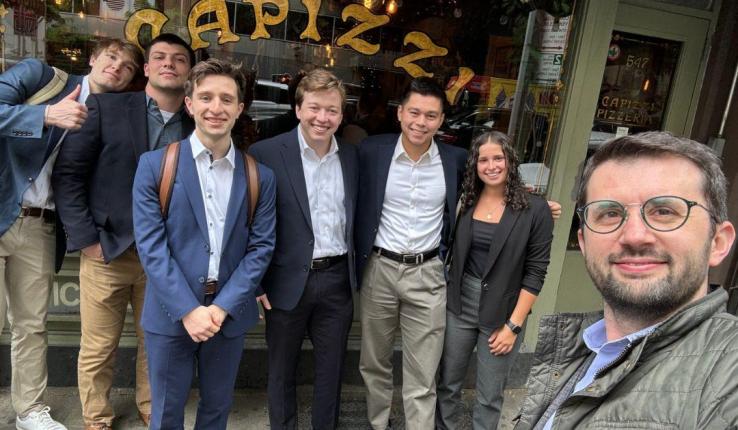Ahmed S. Rahman’s research focuses on some of the big picture issues of economics, such as the long-run causes and consequences of economic growth, and the historic and contemporary relationships between economic and military power. His research interests include growth and development, economic history, the economics of immigration and the economics of education. Rahman was recently cited on the impacts on the economy of the coronavirus pandemic, including in HuffPost, InvestorPlace and an Associated Press story.
COVID-19: The Impact on the Economy
A Q&A with Ahmed S. Rahman, associate professor of economics at the College of Business.

Ahmed S. Rahman
Rahman discusses how the pandemic is likely to impact the U.S. and global economy.
Q. How is the coronavirus impacting the U.S. economy?
A. We are now in a recession to be sure. The term is both wholly appropriate and grossly inadequate. Clearly we are “in recess,” a state of near-total suspension of our vocational affairs, waiting for the bell to call us back to work. But recessions are rarely self-induced as this is, not intentionally at least. We might consider this rather more akin to economic fasting. But as we starve off this dreaded illness by staying home, we also risk strangling healthy portions of our society.
Q. What is the economic impact of the virus to the world economy?
A. COVID-19 is coming for the developing world. Unfortunately, I fear policy responses will lack coordination and consistency. India for example, home to 80 million households which have at most a single room in which to shelter, home to 45 million day laborers who migrate from rural to urban centers, implemented the biggest lockdown in human history. Other nations still freely have weekly congregations of religious services. As the pandemic spreads, we may see refugees, revolts and revolutions on a scale never before witnessed.
It also seems inevitable that anti-globalization forces, ascendant for years, will further strengthen. Global supply chain architecture is likely to face a dramatic shift in the coming months and years. Much like banks were made to endure “stress tests” after the 2008 Financial Crisis, supply chain operations are undergoing similar kinds of tests right now. The vulnerability of the system has already been starkly exposed, and many companies will respond by retrenching their organizations, shortening supply lines and working closer to their home bases.
Q. Can the economy bounce back? What would that look like, and how?
A. I’m afraid “bounce” sounds like an optimistic verb to me. Much depends on the policy responses, some which clearly would be effective, and others which may work but would involve painful tradeoffs.
First and perhaps most importantly, if jobs can be preserved the recovery will happen more quickly once the health crisis abates. The government could help firms pay the wages of inactive staff over the next few months. By subsidizing firms to keep workers on their payrolls, households can pay for essentials while maintaining some job security. Firms meanwhile can remain in business and maintain essential operations.
This preservation of firm-worker relations is crucial, since prolonged stretches of unemployment erode skills and weaken ties to labor markets. They also incentivize existing and new firms to invest in automating technologies. When the health danger dies down, erstwhile jobs may not return, and those which do may not find the necessary skills to match with these positions. The “bounce” we will experience may then look more like the “dead cat” variety.
The harder choice involves how much quarantining we should maintain, and how much economic activity we should countenance. Politicians who aver that they will defeat this pandemic no matter the cost stir hearts but betray economic realities. Policy makers in fact face a terrible tradeoff: risk economic calamity, or risk people’s lives. So far the government has for the most part correctly stressed the former to limit the latter. This buys us precious time, to shore up on critical medical supplies and to make progress on developing vaccines. But as weeks become months, the economic and social damages will mount, and the people will increasingly agitate for their long-denied bread and circuses.
There is evidence from the 1918 epidemic that cities which imposed stricter quarantines faced fewer deaths and experienced faster economic recoveries. That pandemic however killed those mostly in their prime, whereas this illness disproportionately affects those of retirement age. So there may be some ability to get portions of the labor force back to work without a resurgence of the disease. Right now, however, there is no clear exit strategy. How, and the speed at which, we transition from asceticism to activity will dictate if we recover swiftly from economic ruin.
Q. How effective have national or international response efforts been, in terms of economic impact?
A. In short, our policy makers have been making a mess of things. The government should not be focused on stimulating demand. Our epidemiological cure sadly calls for more macroeconomic pain.
During the Great Depression, services accounted for less than half of economic output, now it is more than three-fourths. The rub is that most services require something we have been asked to repudiate—human interaction. What will stimulus accomplish if would-be customers are not permitted to venture outside? We cannot get haircuts, and barbers cannot stockpile haircuts. The result is an aggregate spending multiplier so shrunken that dollars injected into the economy by the government will result in dollars squirreled away, not spent. Policies such as rent forgiveness, humanely made and politically expedient, compound the problem.
The U.S. has so far focused on unemployment insurance and direct cash payouts. But giving money to households directly to stimulate demand is the wrong approach. With record employment just a few months ago, most in the labor force had jobs. Preserving those positions should have been a top priority. The goal should be to slow the economy down now while maintaining the ability to jump start it once the pandemic ends. That means keeping businesses afloat and workers on their payrolls. Our highest priorities are not consumer spending and job creation, they are disaster relief and job preservation. But events taking shape now will soon be written up as case studies to be taught at Lehigh Business on what not to do.
On the international front, responses to the pandemic have been narrow and parochial. Global coordination will be desperately needed. For example, international business travel spurs knowledge sharing and growth even as it helps spread the disease. Travel bans may be wise but they should be discussed and forged together by multiple nations, not decreed unilaterally.
Q. What are we not asking about the economy now in view of the virus that we should be looking at?
A. Amidst the current darkness comes rays of hope for the future. The Black Death eviscerated ancient feudal systems and elevated the living standards of millions of workers of later generations. So we might consider this as an opportunity for a grand reset from our antediluvian ways once the pandemic lifts. Perhaps now we can invest in year-round education rather than watch our children's brains fall into "summer slide" and school facilities lapse to disuse during long summer breaks. Perhaps now we can reinvent the nature of the workspace and forever banish the cubicle to Dilbert cartoons. And perhaps now we can form a new global system that can foster cross-country coordination during crises, much as was done after the Second World War. This requires global leaders to look past the current chaos, to ask the right questions and to gleam a longer-run vision. Only then will our economy, and our world, emerge stronger than before.




